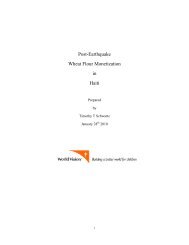Food Consumption Patterns Part 2
Create successful ePaper yourself
Turn your PDF publications into a flip-book with our unique Google optimized e-Paper software.
99<br />
Distributors and Credit<br />
All distributors would request/require credit for new product so that they can promote the new<br />
product. Distributors large and small said they would expect any producer of a new snack product<br />
to advertise and provide samples/tastings to introduce the product to their customers. In Port-au-<br />
Prince, this promotional/introductory period often involves the presence of a sales representative<br />
of the company posted at the sales station of the warehouse to pitch the product to customers. In<br />
this period, to minimize risk, distributors expect to sell on consignment, with the manufacturer<br />
providing the product and receiving payment only for what sells. Only after seeing that the product<br />
sells are they willing to commit to selling a set amount, or purchasing product outright for resale.<br />
The penetration price point can only be raised slowly once a sales record is established.<br />
Government, Import Duties, Sales Taxes and Licenses<br />
If imported, peanut-based products face<br />
significant post-production customs and sales<br />
duties: a 5% of value customs verification fee,<br />
3% to 20% of value duty (varying by product),<br />
and 10% sales tax. If sourced and produced<br />
locally post production only a 10% sales tax<br />
applies.<br />
For imports, shipping costs must also be factored<br />
in. The cost of Miami to Port-au-Prince shipping,<br />
handling and other related costs for a 20-foot<br />
container is USD $1,200.<br />
Photo 54: Distributor in Cape Haitian,<br />
Extruded Corn Snacks out front<br />
If producing locally, a prospective<br />
manufacturer must present the Haitian<br />
government with a study and documentation on all machinery and raw material. If approved, the<br />
Haitian government charges no taxes on imported raw material, packaging material, or machinery,<br />
and no income tax for up to 10 years.<br />
Labeling, Size and Packaging<br />
Legally the products must be traceable, they must be labeled and specify origin and nutritional<br />
content. Distributors with their own brands--Bongu and Stanco—want their logos on the sachets.<br />
All distributors expressed an interest in printed claim of high nutrition and, if possible/true, the<br />
fact that the product is made of local materials (note however that Bongu has refused to sell peanut<br />
butter).<br />
Distributors recommended number of sachets per case are 100 sachets. Distributors uniformly said<br />
that the larger quantities are more appealing to retailers, as higher volume sales made possible with<br />
larger packing units helps reduce costs and maximize profits.
















